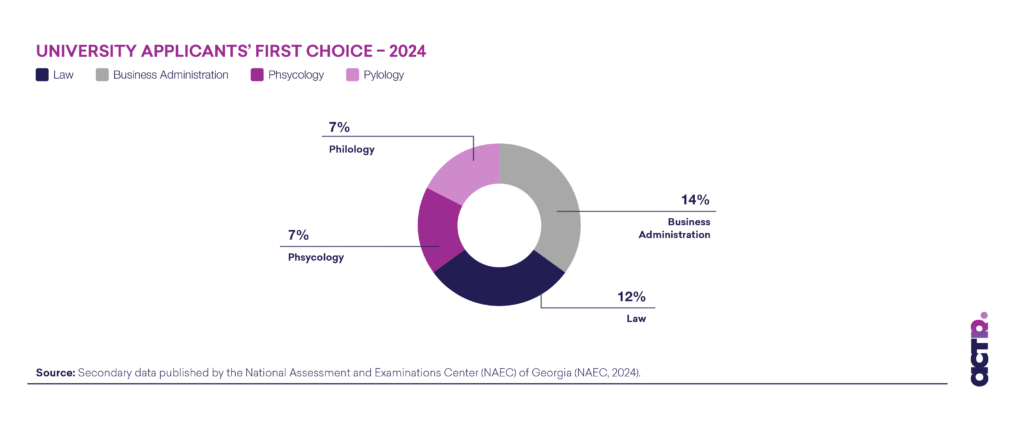What Does University Applicants’ Professional Choice Tell Us – Trends in Georgia and International Parallels (2021-2024)

What Does University Applicants’ Professional Choice Tell Us – Trends in Georgia and International Parallels (2021-2024)
University applicants’ career choices reflect the dynamics of both local and international labor markets. In general, the educational fields chosen by young people reflect both individual aspirations and collective expectations – concerning future professions, employment prospects, and socio-economic trends (Altbach et al., 2009). Their choice shows us how young people see their own future, what values they consider important, and how they respond to the reality that surrounds them.
The article is based on secondary data published by the National Assessment and Examinations Center (NAEC) of Georgia, specifically the analysis of programs that university applicants’ indicated as their first choice in 2021-2024 (NAEC, 2024). In the article, we will evaluate the trends, examine how well they align with labor market demands, and assess the extent to which these choices reflect international and regional trends (Eurostat, 2023; NCES, 2023; OECD, 2023).
Which programs do university applicants choose most often?
As data from recent years shows, several professional fields consistently maintain leading positions. Among them, business administration stands out as the most dominant.

According to data from the National Assessment and Examinations Center (NAEC), in 2024 about 14% of university applicants indicated business administration as their first choice. This figure has remained practically unchanged in recent years: in 2023 and 2022 it was 13%, while in 2021 it was about 14% (NAEC, 2024). Such stable dynamics indicate that this field is regarded by young people as a reliable and attractive choice in the long term.
The attractiveness of business administration can be explained by its broad and flexible profile. This field is not limited to one specific direction – university applicants have the opportunity to later choose subfields such as management, marketing, finance, international business, and etc. Therefore, this specialty is also quite appealing to young people who are still searching for their professional identity and are in the process of defining their career interests. International experience also shows that programs offering university applicants diverse career paths are particularly attractive to them (OECD, 2023).
According to data from the European Statistics Agency (Eurostat), at the higher education level across the European Union, about one-fourth of university applicants (24.5%) choose programs in business, administration, and law, which is the highest share among all educational fields (Eurostat, 2023). A similar trend is observed in the United States as well: according to the National Center for Education Statistics (NCES), business administration accounts for about 18.8% of all undergraduate students (NCES, 2023).
From a regional perspective as well, in Armenia, Azerbaijan, and Turkey this program remains one of the most in-demand. This global and regional alignment indicates that business administration is perceived as a universal and practical choice, one that responds to the needs of both local and international labor markets.
Following business administration, the second most in-demand educational program in Georgia is law. According to 2024 data, 12% of university applicants chose this specialty as their first choice, once again confirming the sustainability of its popularity (NAEC, 2024).
A similar trend is observed in the European Union as well. According to Eurostat, law is one of the most frequently chosen fields, which further highlights its universality and stable position.
The regional picture is identical: in Armenia, Turkey, and Azerbaijan interest in law is high. This may be explained by the fact that law, as a discipline, is often perceived as broad and adaptable – not only for the legal field itself, but also for public administration, diplomacy, and the non-governmental sector. Moreover, since law may be associated with stability, social status, and wide employment opportunities in both the public and private sectors, the professional path in this field may appear clearer, more predictable, and therefore more attractive for young people.
In 2024, psychology ranks third among university applicants’ choices. According to data from the National Assessment and Examinations Center, about 7% of university applicants indicated psychology as their first choice in 2024. This figure has remained nearly unchanged over the past four years – it was 6% in 2023 and 2022, and 8% in 2021 (NAEC, 2024). The data shows that interest in the field has remained consistently steady over time.
One of the factors that may explain the interest in psychology is the growing social importance of mental health. At the same time, the labor market also shows that psychological competencies are increasingly applied in various fields – including education, marketing, human resource management, social research, and etc. The image of psychology as a profession also plays an important role: it is often associated with humanistic values, empathy, and the strengthening of communication skills – qualities that are especially attractive to young people.
This picture is also confirmed by international data. According to Eurostat, psychology students make up about 4.5% of the total in EU countries, although a sharp increase is observed in the Scandinavian region and in Western Europe, where mental health is considered one of the priorities of education and social policy. (Eurostat, 2023; OECD, 2023). In the United States, psychology at the undergraduate level remains among the top five most in-demand fields, which also indicates steady interest in the profession (NCES, 2023).
Regional parallels also create an interesting context. In Armenia, Azerbaijan, and Turkey, psychology remains a field of high interest, especially considering that in these countries it is closely linked to the education system and social support services (UNICEF Armenia, 2023; YÖK Atlas, 2023).
In the case of philology, this choice has increased in Georgia between 2021 and 2024, and by 2024 it was indicated as the first choice by 7% of university applicants. Interest in philology as an academic discipline may be driven by several factors, such as its close connection with education, translation, science, and international relations – fields that create and reflect cultural capital and are therefore considered attractive for young people (UNESCO IESALC, 2023).
In the European Union and the United States, the share of philology programs is relatively small – however, language and literature fields remain one of the most stable areas within the humanities in European and U.S. universities. (Eurostat, 2023).
At the regional level as well, philology is perceived as a highly competitive and in-demand program in Turkey and Armenia. According to data from Turkey’s YÖK Atlas, philology programs are integrated into both cultural and technological as well as international educational contexts.
The choice of philology may reflect not only a growing academic interest but also the values associated with this field. Philology is linked to intellectual and cultural capital, which makes it particularly appealing to those who envision their future in pedagogy, research, literature, or other intellectual spheres.
Furthermore, proficiency in foreign languages today is not only a linguistic skill but also a form of economic asset. In the era of globalization, the need for multilingual communication is increasing in fields such as international relations, diplomacy, and multicultural management. According to the European Commission, linguistic diversity in higher education is increasingly considered a strategic priority, which strengthens the role of this field in the labor market.
Professional fields
Applicants’ choices cover a wide range of programs. According to 2024 data, particularly strong interest is observed in programs related to technical and engineering fields, including computer science, engineering technologies, and programming. Social and political sciences also hold a significant share, including international relations and political science. Within the humanities, there is high interest in philology and psychology programs.
We can say that interest in technical fields is growing – not only in Georgia but also in line with international trends. In developed countries, STEM – science, technology, engineering, and mathematics -fields play a leading role, as technological progress depends precisely on these areas. According to OECD and European Union data, technical professions are considered among the most in-demand in the labor market. Interest in computer science, however, may indicate an interest in digital professions and global issues.
Overall, it can be said that trends in professional choices in Georgia largely align with global standards, particularly in the fields of business, law, and technical disciplines. However, applicants’ choices are not merely a reflection of the global labor market – they are also shaped by factors such as the socio-cultural context, social perception, and local specificities, which significantly influence the content of professional choices and their possible directions.